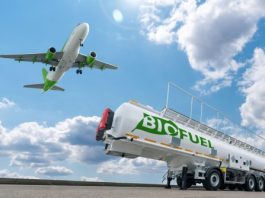In a significant step towards reducing the environmental impact of the aviation industry, the Federal Aviation Administration (FAA) has announced $291m funding to develop clean aviation fuel technologies.
These funds, provided via the Inflation Reduction Act (IRA), are aimed at fostering the development and adoption of sustainable jet fuel and other low-emission aviation technologies.
The overarching goal is to achieve net-zero greenhouse gas emissions from aviation by 2050, a target set by the nation’s Aviation Climate Action Plan.
A commitment to a greener aviation industry
“The Biden-Harris Administration is committed to enhancing the safety, sustainability and efficiency of our national air transportation system—and reaching our mid-century target of net-zero emissions,” stated Secretary of Transportation Pete Buttigieg.
“These grants will help put the world on a path toward decarbonising aviation while fostering domestic economic growth and ensuring the US retains its global leadership in aviation.”
The FAA’s Fueling Aviation’s Sustainable Transition (FAST) grants are divided into two main categories.
The first category allocates $244.5m for 22 projects that focus on the production, transportation, blending, or storage of sustainable aviation fuel.
The second category awards $46.5m to 14 projects dedicated to developing, demonstrating, or applying low-emission aviation technologies.
Major investments in sustainable jet fuel
Sustainable aviation fuel is at the heart of this initiative. Made from renewable sources, it is designed to reduce carbon pollution significantly over its lifecycle compared to conventional jet fuel.
Importantly, it can be safely used in existing aircraft and engines, making it a viable short-term solution to the aviation industry’s carbon problem.
Among the notable projects receiving FAST grants is a $16.8m award to Gevo, Inc. This funding will enable the conversion of an existing fuel facility in Luverne, Minnesota, into a fully integrated alcohol-to-jet production facility for sustainable aviation fuel.
Another project includes a $240,000 grant to the City of Atlanta to study the regional supply chains and infrastructure needed to deploy SAF at Hartsfield-Jackson Atlanta International Airport, one of the busiest airports in the world.
The benefits of sustainable jet fuel
The shift towards sustainable jet fuel offers several environmental and economic benefits. First and foremost, sustainable jet fuel drastically reduces the carbon footprint of aviation.
Traditional jet fuel is a significant contributor to greenhouse gas emissions, accounting for a large portion of global carbon dioxide emissions.
Green fuel, produced from renewable feedstocks like agricultural waste, algae, or even municipal waste, can reduce lifecycle carbon emissions significantly compared to conventional jet fuel.
Moreover, the use of sustainable aviation fuel supports energy security and independence. By reducing reliance on fossil fuels, it helps diversify the energy sources used in aviation, making the industry more resilient to fluctuations in oil prices and supply disruptions.
This is particularly important for a sector that has historically been vulnerable to oil market volatility.
Economically, the development and deployment of green jet fuel create jobs and stimulate innovation within the US.
By investing in production facilities and supply chains, the FAST grants are driving growth in a sector that is poised to become increasingly important as global demand for sustainable energy solutions rises.
Accelerating towards net-zero emissions
The FAST grants are not only a critical component of the FAA’s strategy to achieve net-zero emissions by 2050 but also serve as a catalyst for innovation and collaboration across the aviation industry.
Grant recipients range from established fuel producers and supply chain companies to startup enterprises and academic institutions, all working together to push the boundaries of what is possible in sustainable aviation.
As Laurence Wildgoose, FAA Assistant Administrator for Policy, International Affairs, and Environment, noted: “The projects are instrumental in advancing our environmental and economic sustainability goals by facilitating the development and implementation of sustainable aviation fuels.”
With these investments, the US is taking a leadership role in the global effort to decarbonise aviation, setting the stage for a more sustainable future in air travel.









